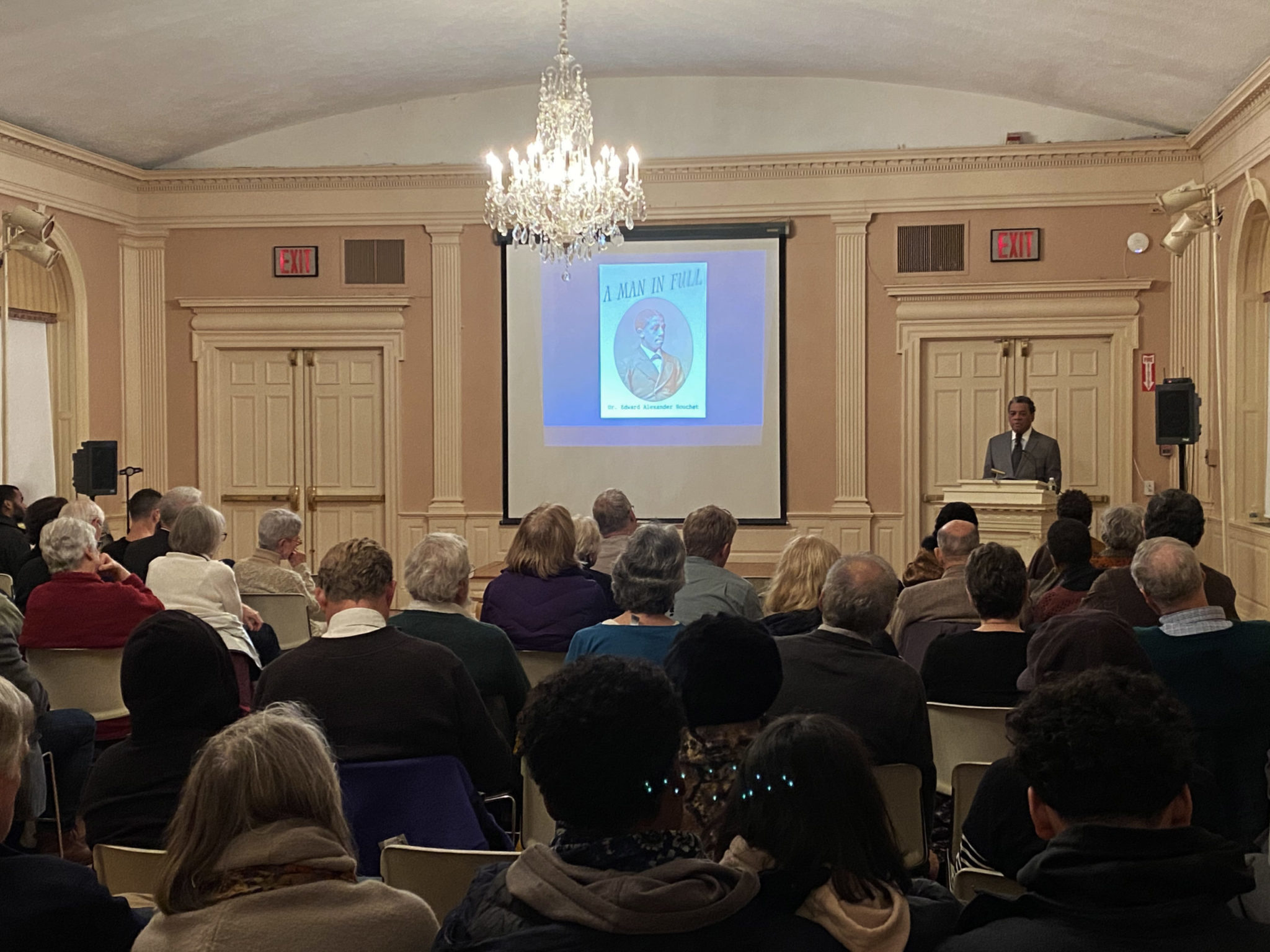
Rebecca Huang
Nearly every seat was filled in the New Haven Museum Auditorium on Tuesday, as over 60 people came to hear playwright Calvin Alexander Ramsey honor Edward Alexander Bouchet — the first African American to earn a doctorate degree in the United States.
Ramsey’s presentation, which fittingly took place during Black History Month, provided insight into the little-known story of Bouchet.
“It’s been a sort of a labor of love to find out about him because I didn’t know about this gentleman… or how this all came to be,” Ramsey said during his presentation.
In addition to discussing the life of Bouchet himself, Ramsey’s presentation delved into the rich history of New Haven. According to Ramsey, Bouchet lived his life in buildings that still stand today.
“It’s interesting to think about the ghosts that were walking down [Temple] Street so that makes it a little more personal to us,” local resident Barbara Gaab said in an interview with the News.
Ramsey, born in Maryland and raised in North Carolina, is a playwright and children’s book author. Although originally working at an insurance agency, Ramsey decided to quit after 9/11 and pursue his dream of becoming a writer.
Today, his play “The Green Book,” which delves into race relations during the Jim Crow Era, is currently on tour in Houston through February 23, and his children’s book Ruth and the Green Book is read every MLK day here in New Haven.
Ramsey’s newest project is an in-depth examination of Bouchet’s life and an acknowledgment of the support of his family and the New Haven community. Ramsey first stumbled upon the subject of his play when walking into Sterling Library and seeing a portrait of Bouchet. Working with Dr. Curtis Patton, Professor Emeritus in the Yale School of Medicine, Ramsey sought to understand Bouchet’s enigmatic story and embarked on the beginning of his research.
“I’m just honored to be able to be part of this gentlemen’s life and his community, because this was not done just by one person,” Ramsey said. “It was black and white pulling together making this all happen.”
At the event, Ramsey shared with the crowd the unknown story of Bouchet as well as his vision for his unfinished play. In 1824, John B. Robertson, the son of a wealthy plantation owner, moved from Charleston to New Haven, bringing William Francis Bouchet with him as a slave. Robertson graduated from Yale University and afterwards, granted William his freedom. William joined the Temple Street Congregation, where he met his wife Susan Cooley, a free woman of color. Along with a large percentage of New Haven’s community, they were actively involved in reform and abolitionist activities. Susan and William gave birth to their son Edward in 1852.
According to Ramsey, after United States v. Amistad, when the Supreme Court ruled in favor of the Amistad captives, the New Haven community rallied in support of abolition and African American social improvement. The movement stressed the importance of education, and William sent all of his children to school.
In his sophomore year of high school, Bouchet took the entrance exam for Hopkins School and passed. He attended Hopkins for his last two years of high school and graduated as the class valedictorian. Afterwards, he was accepted to Yale, where he finished sixth in his graduating class of 124 and became a member of the Phi Beta Kappa society. Bouchet was the only black person on campus during his four years as an undergraduate. Although unclear how Bouchet was able to afford either Hopkins or Yale, Ramsey speculated that Robertson likely played a role in paying for his educational opportunities.
After graduating from Yale, the Philadelphia Institute of Colored Youth, a high school started by the Quakers, paid for his graduate education and offered him a job. In 1876, Bouchet became the first African American to earn a doctorate degree in the United States, graduating with a Ph.D. in Physics.
Bouchet worked at the Institute for Colored Youth for 26 years, earning a salary of $1,200 a year. However, at the height of the controversy between Booker T. Washington and W.E.B. Du Bois over vocational education, most of Bouchet’s colleagues were fired for what others viewed as unnecessary teaching, and Bouchet resigned in 1902.
Bouchet spent the remaining 14 years of his life unsettled, moving around the country from job to job and never marrying. Bouchet returned home ill with heart conditions in 1916, spending the last two years of his life with his mother and his childhood home. Bouchet passed away in 1918.
Ramsey wants to tell the play from the perspective of Bouchet’s mother, who witnessed his life from birth to death. In writing his play, Ramsey says that he has “been taking some liberties with Bouchet’s mother but I’m a father and I can imagine what it would feel like to have a child coming home to die.”
After years of research, Ramsey plans to debut his finished product in the following year, and wants to include local actors from schools in New Haven. He hopes to use his play to tell Bouchet’s trailblazing yet unknown story.
“I thought Mr. Ramsey was just infectious in his ability to share his information and whet our appetites on working on the mystery,” New Haven resident Jeff Borne said in an interview with the News.
The New Haven Museum is located on 114 Whitney Avenue.
Rebecca Huang | rebecca.huang@yale.edu
Correction, Feb. 20: A previous version of this article said that Bouchet was born in 1824. In fact, he was born in 1852.
Interested in getting more news about New Haven? Join our newsletter!







